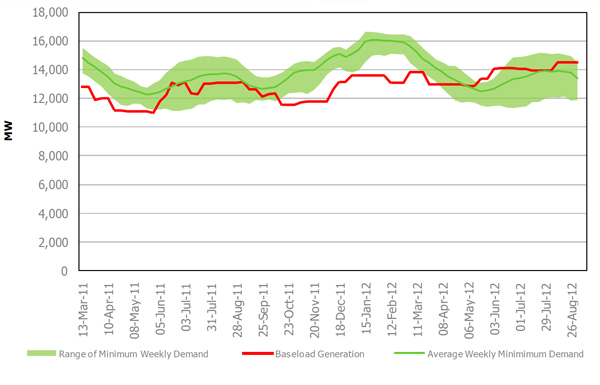Toronto: A group of generators has asked that the Independent Power System Operator increase the speed with which it is addressing problems related to Surplus Baseload Generation (SBG). The group submitted a letter on behalf of generators as part of the IESO process for collecting input on current priority issues.

The generator letter, prepared by Richard Horrobin of Bruce Power and Craig Martin of TransCanada Energy Ltd., the generator representatives on the IESO Stakeholder Advisory Committee, made the following observations:
“The generator community is not satisfied with the pace of progress on the SBG issue. We believe this is an urgent matter worthy of an immediate formal process for the development of a solution. In support of this claim, we submit for your consideration that the IESO is forecasting SBG in 14.5% of hours by 2013. Put another way, IESO is forecasting 51 solid days of SBG. This is a 400% increase over 2010 levels and it will have widespread impacts for IESO and many of its stakeholders. We are hopeful that a discussion of this matter at SAC is simply a starting point. Our objective would be to see a formal plan for development and implementation of a meaningful solution to the issue before the end of 2011.”
On export tariffs, the letter noted that “We are concerned that the future will bring additional increases to the level of the export tariff and that these increases will be detrimental to IESO markets in general and the SBG issue in particular. While the generator sector is preparing to participate in a more fulsome fashion in future proceedings on this matter, we call on the IESO to monitor the impact that this decision has on Ontario energy prices, Global Adjustment and the SBG issue; and to report their findings at upcoming meetings of the Stakeholder Advisory Committee.”
The letter covered a number of other issues and also said that, “There are a number of active stakeholder engagements that have not been progressing for some time (years in some cases). IESO may wish to consider a strategy for dealing with this backlog as part of its business planning process in 2012-2013.” Concerned about how market rule changes have not always been completely consistent with generation contracts, the writers also said that, “Generators would encourage the IESO to consider the requirement to amend or modify OPA generator contracts at the outset of any new market initiatives undertaken in the business planning process.”
At the IESO’s Stakeholder Advisory Committee meeting of March 2, Bruce, Campbell, the IESO’s Vice President of Resource Integration, advised the Committee that the IESO is considering options for dealing with negative priced exports including market rule changes to eliminate payments on exports during negative priced hours as well as the need to dispatch renewable power sources. There are ongoing discussions about dispatchability taking place between the IESO, the OPA and the Renewable Energy Standard contract holders who are currently generating most of the province’s wind power, he said. The IESO’s Renewables Integration stakeholder consultation is looking at longer-term initiatives and dispatch is one of the three principles that have been put forward for discussion.
Richard Horrobin asked for analytical work to support the impact of the rule change being considered by the Technical Panel, and specifically on what impact a rule change would likely have during times of SBG. He also sought confirmation that a rule change would be implemented only when its impacts are fully understood.
